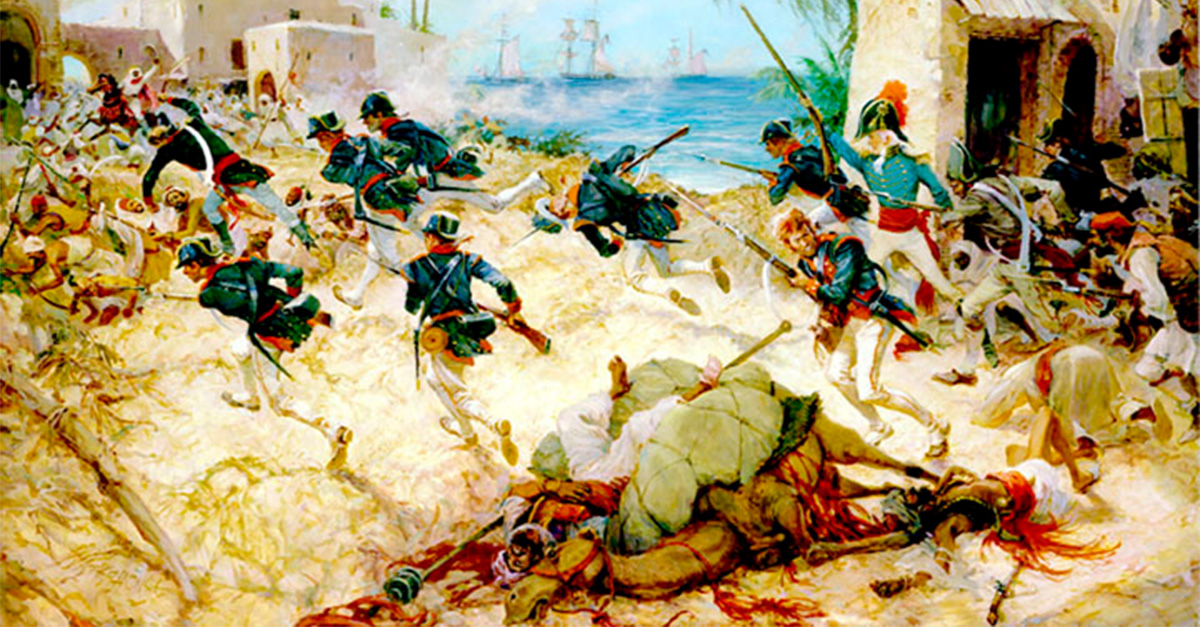


Get a free copy of Parental Rights & Education when you subscribe to our newsletter!

In winning the Barbary Wars more than 200 years ago, America showed the world that military strength and resolve, not capitulation and negotiation, are the keys to defeating terrorism and hostage-taking.
On May 14, 1801, the pasha of Tripoli chopped down the American flagpole at the American consulate after President Thomas Jefferson refused to pay a “tribute” allowing American ships to freely sail in the Mediterranean Sea — marking the first time another nation declared war on the United States.
Nearly four years later, a ragtag group of U.S. Marines would dramatically end that war at the Battle of Derna, an event that would be forever memorialized in the opening lyric of the Marines’ Hymn: “From the Halls of Montezuma to the Shores of Tripoli.”
The roots of this conflict, better known as the First and Second Barbary Wars, took place many years prior with the conclusion of the War for Independence in 1783, proving that the benefits of victory are often accompanied by unexpected costs and new vulnerabilities.
Until that time, the British naval fleet had protected American merchant ships traversing the Atlantic, entering the straits of Gibraltar, and trading with countries bordering the Mediterranean Sea. No longer a fledging colony under the protection of Great Britain, the United States of America would be forced to realize that making agreements and trading with Europeans would include a new obstacle — the Barbary Pirates.
For centuries, Muslim pirates controlled the southern portion of the Mediterranean along the northern shoreline of the African continent and their economy depended on the spoil taken from ships sailing into the region without protection.
If a vulnerable merchant ship without proper identification ventured into the buccaneers’ territory, the capture and confiscation of vessel, cargo, and crew were certain. Those aboard would be taken as slaves and then used to build the port cities in the Muslim-controlled region known as the Barbary Coast, a coastline that extended from the Rock of Gibraltar to the border of Egypt and comprised the countries of Morocco, Algeria, Tunisia, and Tripolitania (modern-day Libya).
The city of Tripoli was a prime area for pirate activity as it was centrally located between the east and west boundaries.
Any “infidels” who were captured and enslaved by the pirates were subject to significant horrors, until ransom was paid, death occurred from starvation or work conditions, or they voluntarily converted to Islam (a pragmatic move, as Muslims could not enslave their own, according to their interpretation of the Koran). The Muslims also put together raiding parties to assault coastal communities throughout Europe and take additional captives, with the payment necessary for releasing women and children being greater than for men, though ransom was not always paid.
Fully aware that the British fleet no longer protected the American vessels as they attempted to continue trade with Europe, the unforeseen detriment of U.S. independence became an opportunity for the pirates. American interests quickly became their prey.
The first American ship to be captured was a Boston merchant ship in 1784.
Initially, the United States was willing to pay tribute to gain the release of the ship, cargo, and crew. Other countries were paying a flexible tributary tax as a cost of doing business — the more vulnerable the country, the greater the amount of extortion. Sensing weakness from the newly christened United States of America due to its lack of naval support, the Barbary Pirates significantly increased their waterway taxes.
How could America rectify the situation? Initially, American leaders chose to go along to get along, spending a large portion of America’s tax revenues in a pay-to-play scheme in the Mediterranean Sea that also featured hostage taking. Until there was a modicum of recognized strength, justice and honor acquiesced to ransom.
Continual provocation against American interests by the pirates of the Barbary Coast, however, finally compelled American leaders to build a navy. Six warships were commissioned by Congress in 1794. In 1797, the USS Constitution, an appropriately named frigate, became the first vessel of the U.S. Navy.
Even though civil unrest in the Tripoli region pitted the ruling family’s sons against each other, the instability on land did nothing to deter the pirates from continuing their marauding pillage of American interests. Even as it experienced defeat financially and commercially, America quietly advanced its decision to expand its seaworthy strength.
Attempted communication through consulates, agreed-upon peace treaties, and unsupported threats from the United States were limited in effectiveness. When Thomas Jefferson was elected in 1801, the pirates fully expected to continue taking a significant amount of America’s revenue.
Jefferson refused.
Within months came Tripoli’s declaration of war against the United States.
Amazing feats of daring and risk defined the war with the Barbary Pirates, as both the Navy and the Marines were established to combat Muslim terrorists.
The first coastal blockade of the Barbary Pirates was unsuccessful. A larger fleet was dispatched to the Mediterranean in 1803 to protect American interests. Unfortunately, the USS Philadelphia ran aground and was captured by the pirates in October. To keep the American warship from being refloated and used against American interests, the crew of another American vessel, the well-disguised USS Intrepid (also appropriately named), eliminated the Philadelphia’s effectiveness by setting it ablaze in Tripoli’s harbor in February 1804.
Skirmishes between Navy ships and Barbary forces continued, but the U.S. made little headway. Believing that a land attack was necessary to actually win the war, William Eaton, a U.S. Army officer and former ambassador, took a group of 600 Arab and European mercenaries, 2 Navy midshipmen, and 8 U.S. Marines and trekked 500 miles across the Libyan desert from Alexandria to the port of Derna in Tripoli. The mission was to overthrow Yusuf Karamanli, the pasha of Tripoli, and replace him with his brother, Hamet, who was not only considered the country’s rightful ruler but had agreed to ally himself with the Americans and travel with Eaton and his fighting men.
Two days after arriving, the group, supported by U.S. naval firepower, attacked the city and its 4,000 defenders on April 27 at 2:30 p.m. Eaton divided his forces, with one group going in from the west to capture the governor’s palace, while the U.S. Marines, under the command of Lt. Presley O’Bannon, made a daring raid of the city’s sea fortress. By the end of the day, 14 of Eaton’s forces had been killed, including 2 Marines. But an American flag had been hoisted over the harbor, marking not just victory but also the first time ever that the stars and stripes had flown over a foreign battlefield.
On May 13, Yusuf attempted to retake Derna, laying siege to Eaton’s men and then attacking, but were quickly defeated.
Believing and hoping that negotiations would be enough to keep the Mediterranean shipping lanes free of provocation and confiscation, a peace treaty was signed in June 1805. The agreement worked to successfully hinder the Barbary pirates, so long as the U.S. Navy maintained a visible presence in the Mediterranean. Once the U.S. squadron returned to ports in America in 1807, the pirates returned to business as usual, hijacking ships and taking hostages.
A second war lasting three days with the Barbary pirates was needed. Once the War of 1812 was finished, President James Madison declared war on the Barbary States in 1815 and sent a fearless commander, Steven Decatur, to end the continued threats. Decatur was familiar with the region as he had been the captain of the Intrepid when it successfully destroyed the Philadelphia during the first war.
The American show of force led to a release of both European and American captives and slaves and ended the practice of paying tribute. However, the Americans learned from their previous mistakes, this time keeping an American Navy squadron in the Mediterranean.

Our world remains filled with individuals and groups who believe that might equals right and that the best strategies to victory involve a mix of deception, cruelty, and a willingness to exploit weakness in order to achieve political ends.
To that end, our world continues to deal with Muslim extremists who utilize hostage-taking as a military tactic and negotiating ploy, whether that be the 1972 Munich Olympics when 11 Israeli athletes were seized and murdered by Black September terrorists; the 53 American embassy employees held hostage for 444 days by militant Iranian students in 1979; the hijackings and hundreds and kidnappings by Hezbollah, the Popular Front for the Liberation of Palestine, al-Qaeda, ISIS, and other terror groups from the 1960s through the 2010s; or Hamas taking hundreds of innocent civilians hostage during its latest war with Israel.
The only deterrent to such bullying and war crimes is a greater force and righteous principles. Theodore Roosevelt put it most succinctly when he declared that the United States speaking softly while toting a big stick would be the optimal strategy for maintaining peace.
There are many worldwide who hate America and will exploit her vulnerabilities, including her generosity and concern for human life. Today’s terrorists are in many ways much harder to combat than the Barbary pirates, but the key to success continues to be wise leadership, a strong military, and national resolve.
What’s more, our guide for living as a nation and as individuals must be a continual appeal to Heaven in prayer, a regular focus on the Word of God for answers, and a belief that wisdom is found in the counsel of many (Proverbs 11:14).
If you like this article and other content that helps you apply a biblical worldview to today’s politics and culture, consider making a donation here.
Christian conservative news and issues that matter. Curated just for you!
